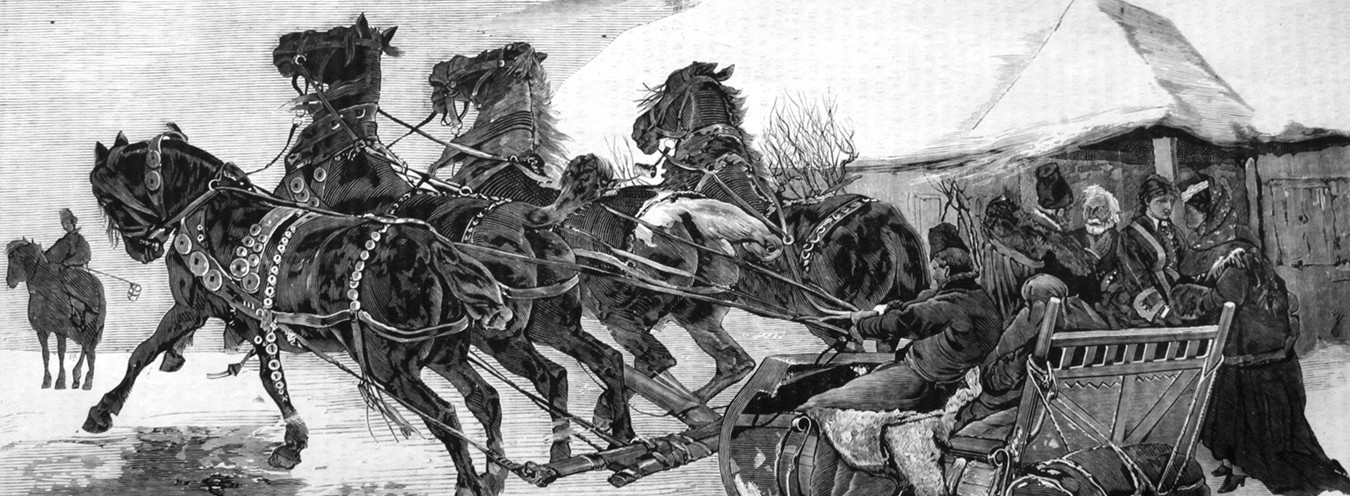
Russia
There are very few traces of Russia and Russianness in The Doll as Prus applied the strategy, quite popular with contemporary writers, of ignoring the presence of the oppressor in artistic representations of social reality, the tactic of the careful avoidance of any mentions of the Russian regime apparatus. The second reason for this phenomenon was a preventive self-censorship, as it was impossible to print texts that contained any unfavourable comments regarding Russia’s policy towards the Kingdom of Poland or works that depicted controversial problems in the bilateral relationships (for example, the issue of Polish exiles in Siberia or persecutions of Poles). The censors were especially attentive to any mentions of the Polish struggle for independence. Despite this censorship, The Doll includes conspicuously visible motifs, though written in Aesopian language, of the November (1830–31) and January (1863–64) Risings. Wokulski’s uncle participated in the former, and the protagonist took part in the latter (Rzecki mentions a risky endeavour before the uprising, which is metaphorically referred to as a jump from the Nowy Zdjazd bridge).
The main space of the novel’s plot, Warsaw, was depicted by Prus with a masterful sense of contemporary reality, yet in his portrayal, the traces of Russianness were consciously removed. For example, the writer does not mention the places that were the military headquarters or the regime’s offices: the Royal Castle (the contemporary seat of the Tsarist governor’s), the Namiestnikowski Palace on Krakowskie Przedmieście, the Belvedere, and the Warsaw Citadel. At the time of the novel’s action, that is in the late 1870s, a brutal action of russification occurred, which was a result of repressive policy after the defeat of the January Rising. Its effects were visible even in architecture: in Russian shop signboards or office plaques. Although Prus could not write openly about these issues, in an allusive way, he rendered the atmosphere of enslavement that dominated the contemporary life in Warsaw and indirectly depicted oppressive actions of the occupant’s regime. Ignacy Rzecki, only apprehensively and cautiously touches upon controversial political issues in his diary and in his conversations with Wokulski. He does not write a lot about his incarceration in Zamość, where he landed (escorted by the police) on his way back from his wonderings after the defeat of the Springtime of Nations (the contemporary reader did not have much difficulty deciphering Rzecki’s notes: I stayed over a year in Zamość. And because I was handy at chopping wood, I was in the open air every day). The growing coercion of censorship is criticised by Szlangbaum, whose charade about Cossacks was withdrawn from print for fear of the censor’s intervention. Rzecki tells Wokulski that socialist students and clerk Klejn were arrested by the Russian police (he does not mention, however, that they studied at the Russian University of Warsaw). Dejected, the old clerk watches the march of the chained convicts.
The spectre of the imperial invader casts a shadow over the world represented in The Doll. Prus, apart from strategic silences and subtle allusions, uses one more method of presenting the Russian theme in the novel. It is embodied by the Russian tradesman Suzin. His very name already evoked reservations from the contemporaries as it had been favourably depicted in the Polish memory. The Suzin family was respected in Lithuania; Adam Suzin, sentenced in the Philomaths and Philarets trial in Vilnius, was portrayed by Adam Mickiewicz in the prison scene of his canonical drama Dziady (Forefathers’ Eve), part III. In The Doll, Suzin is a business partner and a friend of Wokulski; he is jovial, kind-hearted, and reliable in business. The friends met in Siberia, and then Suzin encouraged Wokulski to join him on his journey to Bulgaria as a military provisions’ supplier for the Russian army during the Russo-Turkish War (1877–78). When Wokulski later participates once again in the shady transactions of Suzin in Paris (most likely concerning the arms deals between Russia and France) and when he makes a fortune on it again, he again falls in disfavour with the Polish public opinion (again – as already after Wokulski’s return from Bulgaria, people considering themselves as true patriots go as far as to even accuse him of treason). Yet Prus, rejecting a martyrological way of thinking about his nation, wanted to show the possibility of Polish-Russian relations that would go beyond the invader-victim paradigm. The alternative depicted in the novel is based on economic cooperation, which is profitable for the Polish party (Wokulski establishes a company to trade with the Empire). Such a novel conception of the Russo-Polish relations, contrary to both the Polish nineteenth-century patriotic canon and to the Russian oppressive policy, was challenged by the Tsarist censor. He deleted a fragment of the novel in which in a friendly way Suzin criticises Wokulski’s infatuation with Izabela and mentions a young rich Russian lady in love with him, at the same time mocking the Polish mentality: ‘Oh, you gentleman! Oh, you addlebrained Polish gentleman!’ Suzin laughed. ‘Here is what causes your downfall, all you Poles: with you it’s heart, all heart, for everything, for trade, politics, women, everything – and that is your folly.’ In Suzin’s words, one may trace the writer’s own position as Prus wanted to encourage Poles to change their way of thinking about reality and to start taking into account other factors than political ones and to substitute the ideal of uncompromising struggle with the law of cooperation and barter. Although Prus was unable to write much about Russia and Russianness in The Doll, even the few mentions devoted to this theme have a significant cognitive value.
→ Censorship; → Aesopian language; → Russians in Warsaw; → Suzin; → Poles in Siberia;
Bibliografia
- J. Bachórz, Introduction to B. Prus, Lalka, BN I 262, Wrocław 1991, 1998.
- J. Bachórz, Polak wśród swoich i obcych. Rozmyślanie o Lalce Bolesława Prusa, in Przemiany formuły polskości w drugiej połowie XIX wieku, ed. J. Maciejewski, Warsaw 1999.



